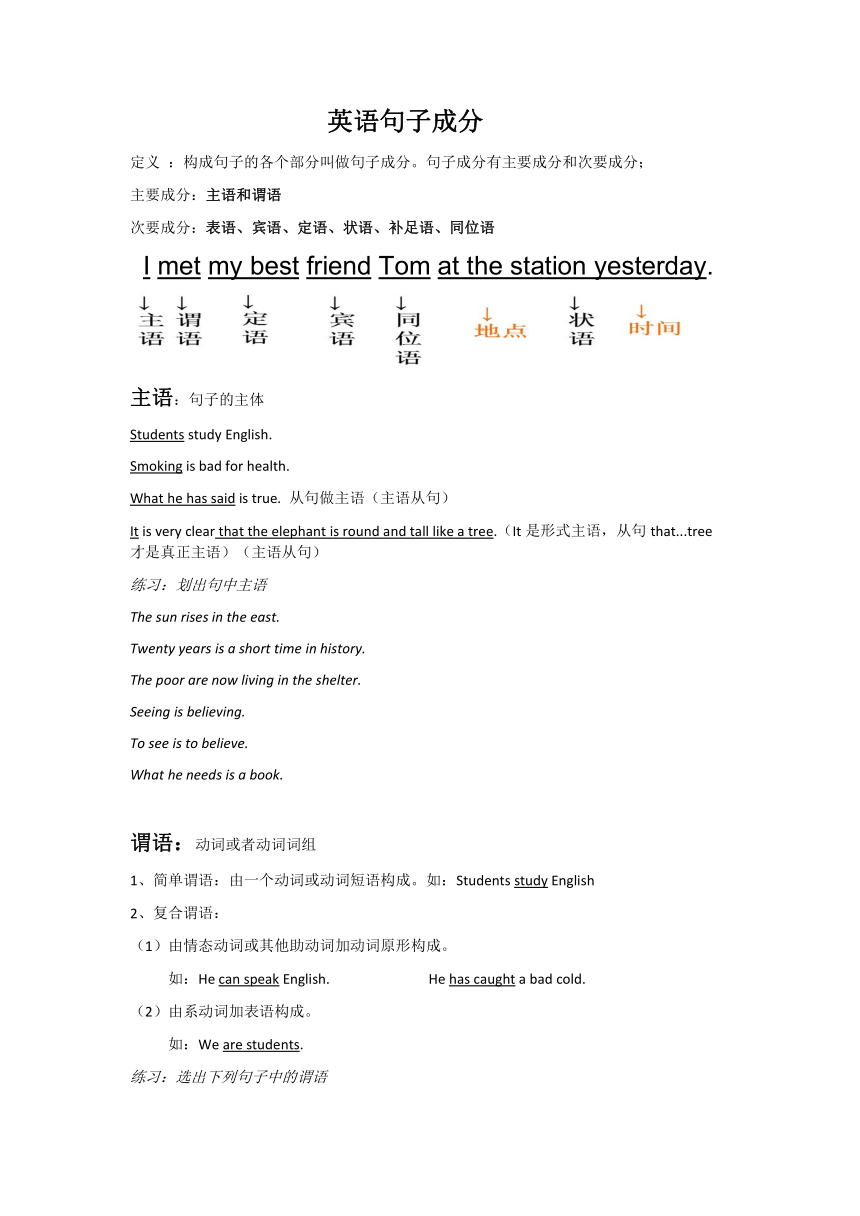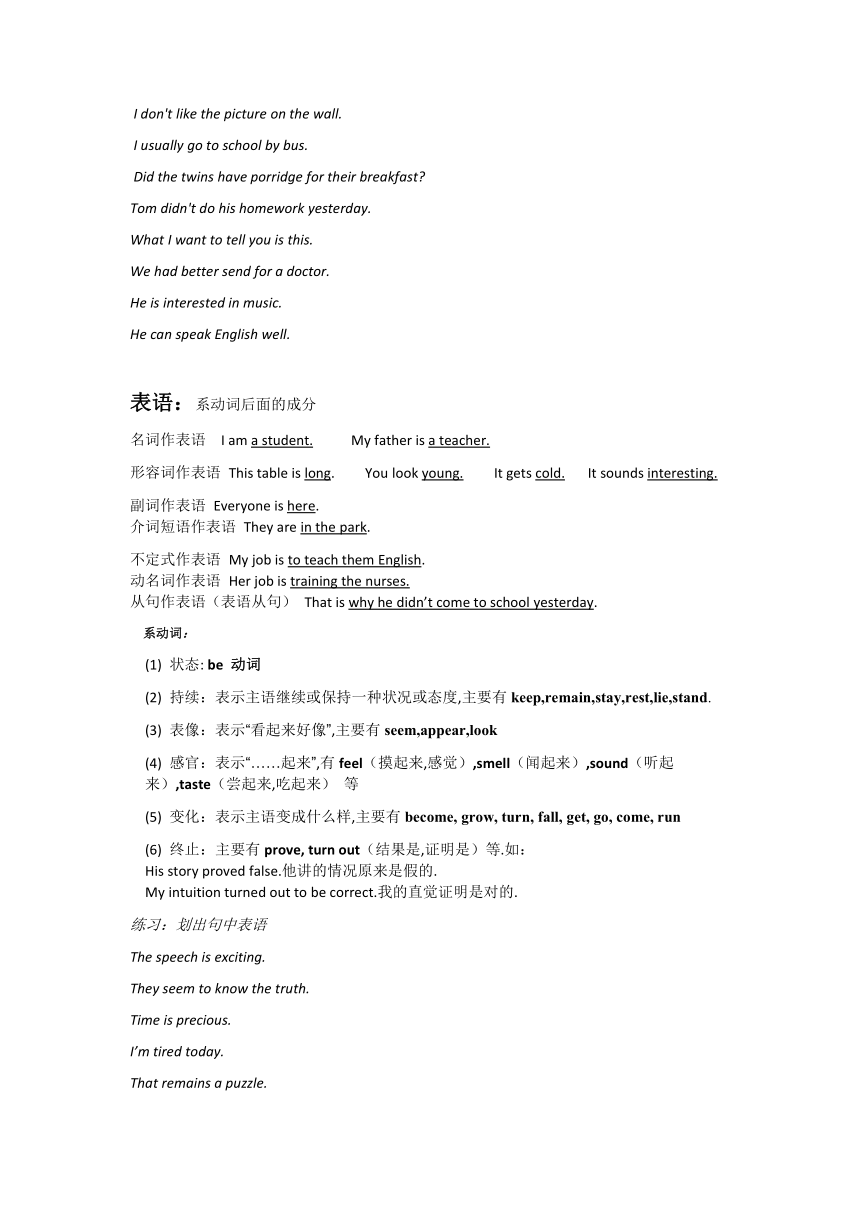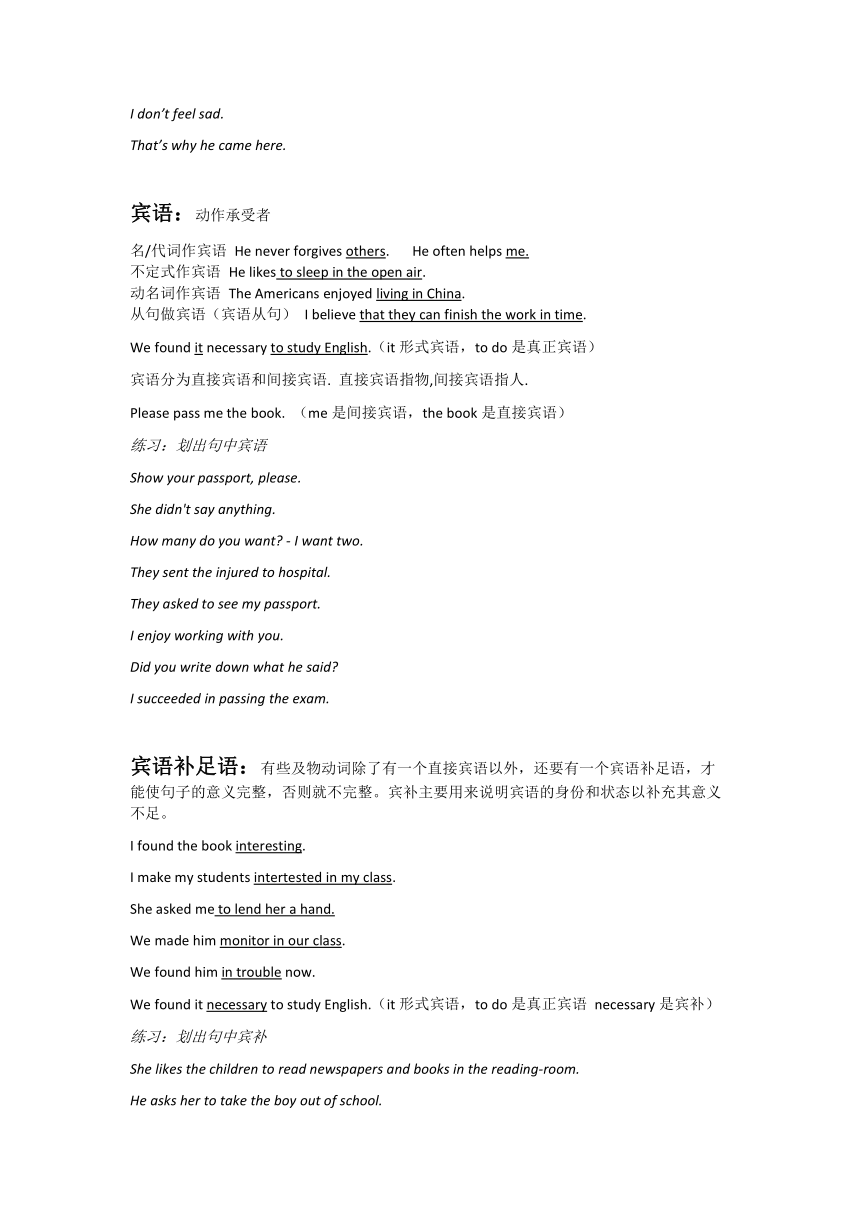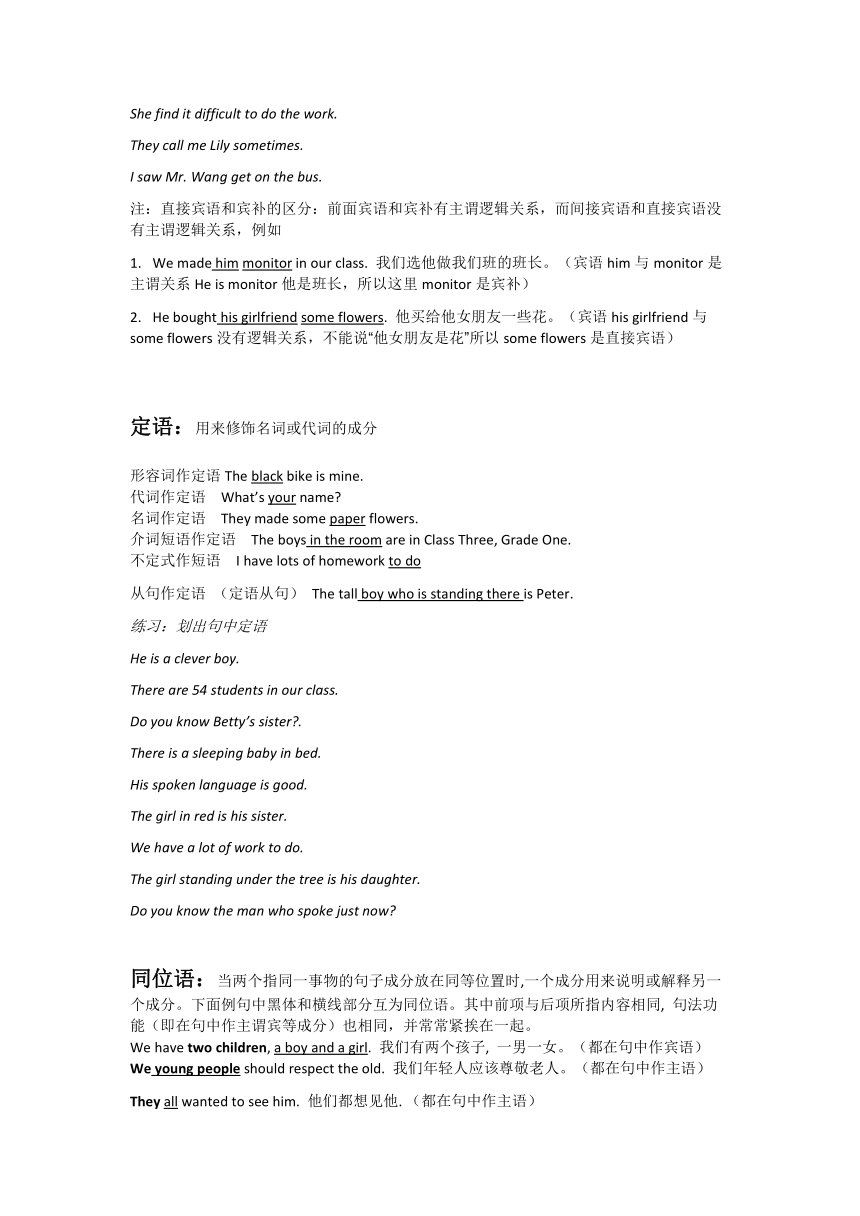人教版(2019) 必修 第一册英语句子成分划分的基本概述 讲义(含答案)
文档属性
| 名称 | 人教版(2019) 必修 第一册英语句子成分划分的基本概述 讲义(含答案) |  | |
| 格式 | docx | ||
| 文件大小 | 90.4KB | ||
| 资源类型 | 教案 | ||
| 版本资源 | 人教版(2019) | ||
| 科目 | 英语 | ||
| 更新时间 | 2024-04-21 21:13:19 | ||
图片预览





文档简介
英语句子成分
定义 :构成句子的各个部分叫做句子成分。句子成分有主要成分和次要成分;
主要成分:主语和谓语
次要成分:表语、宾语、定语、状语、补足语、同位语
I met my best friend Tom at the station yesterday.
主语:句子的主体
Students study English.
Smoking is bad for health.
What he has said is true. 从句做主语(主语从句)
It is very clear that the elephant is round and tall like a tree.(It是形式主语,从句that...tree才是真正主语)(主语从句)
练习:划出句中主语
The sun rises in the east.
Twenty years is a short time in history.
The poor are now living in the shelter.
Seeing is believing.
To see is to believe.
What he needs is a book.
谓语:动词或者动词词组
简单谓语:由一个动词或动词短语构成。如:Students study English
2、复合谓语:
(1)由情态动词或其他助动词加动词原形构成。
如:He can speak English. He has caught a bad cold.
(2)由系动词加表语构成。
如:We are students.
练习:选出下列句子中的谓语
I don't like the picture on the wall.
I usually go to school by bus.
Did the twins have porridge for their breakfast
Tom didn't do his homework yesterday.
What I want to tell you is this.
We had better send for a doctor.
He is interested in music.
He can speak English well.
表语:系动词后面的成分
名词作表语 I am a student. My father is a teacher.
形容词作表语 This table is long. You look young. It gets cold. It sounds interesting.
副词作表语 Everyone is here.
介词短语作表语 They are in the park.
不定式作表语 My job is to teach them English.
动名词作表语 Her job is training the nurses.
从句作表语(表语从句) That is why he didn’t come to school yesterday.
系动词:
(1) 状态: be 动词
(2) 持续:表示主语继续或保持一种状况或态度,主要有keep,remain,stay,rest,lie,stand.
(3) 表像:表示“看起来好像”,主要有seem,appear,look
(4) 感官:表示“……起来”,有feel(摸起来,感觉),smell(闻起来),sound(听起来),taste(尝起来,吃起来) 等
(5) 变化:表示主语变成什么样,主要有become, grow, turn, fall, get, go, come, run
(6) 终止:主要有prove, turn out(结果是,证明是)等.如:
His story proved false.他讲的情况原来是假的.
My intuition turned out to be correct.我的直觉证明是对的.
练习:划出句中表语
The speech is exciting.
They seem to know the truth.
Time is precious.
I’m tired today.
That remains a puzzle.
I don’t feel sad.
That’s why he came here.
宾语:动作承受者
名/代词作宾语 He never forgives others. He often helps me.
不定式作宾语 He likes to sleep in the open air.
动名词作宾语 The Americans enjoyed living in China.
从句做宾语(宾语从句) I believe that they can finish the work in time.
We found it necessary to study English.(it形式宾语,to do是真正宾语)
宾语分为直接宾语和间接宾语. 直接宾语指物,间接宾语指人.
Please pass me the book. (me是间接宾语,the book是直接宾语)
练习:划出句中宾语
Show your passport, please.
She didn't say anything.
How many do you want - I want two.
They sent the injured to hospital.
They asked to see my passport.
I enjoy working with you.
Did you write down what he said
I succeeded in passing the exam.
宾语补足语:有些及物动词除了有一个直接宾语以外,还要有一个宾语补足语,才能使句子的意义完整,否则就不完整。宾补主要用来说明宾语的身份和状态以补充其意义不足。
I found the book interesting.
I make my students intertested in my class.
She asked me to lend her a hand.
We made him monitor in our class.
We found him in trouble now.
We found it necessary to study English.(it形式宾语,to do是真正宾语 necessary是宾补)
练习:划出句中宾补
She likes the children to read newspapers and books in the reading-room.
He asks her to take the boy out of school.
She find it difficult to do the work.
They call me Lily sometimes.
I saw Mr. Wang get on the bus.
注:直接宾语和宾补的区分:前面宾语和宾补有主谓逻辑关系,而间接宾语和直接宾语没有主谓逻辑关系,例如
We made him monitor in our class. 我们选他做我们班的班长。(宾语him与monitor是主谓关系He is monitor他是班长,所以这里monitor是宾补)
He bought his girlfriend some flowers. 他买给他女朋友一些花。(宾语his girlfriend与some flowers没有逻辑关系,不能说“他女朋友是花”所以some flowers是直接宾语)
定语:用来修饰名词或代词的成分
形容词作定语The black bike is mine.
代词作定语 What’s your name
名词作定语 They made some paper flowers.
介词短语作定语 The boys in the room are in Class Three, Grade One.
不定式作短语 I have lots of homework to do
从句作定语 (定语从句) The tall boy who is standing there is Peter.
练习:划出句中定语
He is a clever boy.
There are 54 students in our class.
Do you know Betty’s sister .
There is a sleeping baby in bed.
His spoken language is good.
The girl in red is his sister.
We have a lot of work to do.
The girl standing under the tree is his daughter.
Do you know the man who spoke just now
同位语:当两个指同一事物的句子成分放在同等位置时,一个成分用来说明或解释另一个成分。下面例句中黑体和横线部分互为同位语。其中前项与后项所指内容相同, 句法功能(即在句中作主谓宾等成分)也相同,并常常紧挨在一起。
We have two children, a boy and a girl. 我们有两个孩子, 一男一女。(都在句中作宾语)
We young people should respect the old. 我们年轻人应该尊敬老人。(都在句中作主语)
They all wanted to see him. 他们都想见他. (都在句中作主语)
Let’s you and me go to work, Oliver. 咱们俩去工作吧. (都在句中作主语)
Are you two ready 你们俩准备好了吗 (都在句中作主语)
The news that we are having a holiday tomorrow is not true.
明天放假的消息不确. (都在句中作主语)(同位语从句)
练习:找出句中互为同位语的成分,并指出它们在句中的句法功能
Mrs.Brown, John's mother is a kind lady.
Word came that her husband was killed in an accident.
I am sorry to hear the news that his grandfather is dead.
状语: 按用途可分为时间、地点、方式、原因、结果、目的、条件、让步、程度、方式、伴随 等
(1). 时间状语
Shall we do the shopping today
(2). 地点状语
There are plenty of fish in the sea.
(3). 原因状语
I eat potatoes because I like them.
(4). 结果状语
She spoke so softly that I couldn’t hear what she said.
(5). 目的状语
In order to get into a good school, I must study even harder.
(6). 条件状语
If he were to come, what should we say to him
(7). 让步状语
He helped me although he didn’t know me.
(8). 程度状语
The lecture is very interesting.
(9). 伴随状语
My train starts at six, arriving at Chicago at 10.
练习:划出句中状语
① There was a big smile on her face.
② Every night he heard the noise upstairs.
③ He began to learn English when he was eleven.
④ The man on the motorbike was travelling too fast.
⑤ With the medicine box under her arm, Miss Li hurried off
句子成分划分课后巩固练习题
1. The students got on the school bus.
2. He handed me the newspaper.
3. I shall answer your question after class.
4. His job is to train swimmers.
5. He took many photos in Beijing.
6. His wish is to become a scientist.
7. He told me that his brother is a world-famous doctor.
8. He found it important to master English.
9. He sat there, reading a newspaper.
10. The apples tasted sweet.
11. My grandfather bought me a pair of sports shoes.
12. I love you.
13. Trees turn green when spring comes.
14. Grandma told me an interesting story last night.
15. Lily is cleaning the desk now.
16. Her garden is the best in our town
17. We heard her singing a song.
18. I like this book very much.
19. The girl on the blue bike is Jane’s sister.
20. She didn’t come to my party because she was ill.
21. Wang Ping does his homework carefully.
22. We will go to the Children’s Palace once a week.
23. They are in the classroom.
24. We enjoy listening to the music.
25. I see her dance.
26. We always go to school early.
27. I always find her happy
28. The children bought their parents a car
29. He likes to play basketball.
30. Yesterday I talked to my English teacher, Mr.James.
随堂练习参考答案:
主语:
The sun rises in the east.
Twenty years is a short time in history.
The poor are now living in the shelter.
Seeing is believing.
To see is to believe.
What he needs is a book.
谓语:
I don't like the picture on the wall.
I usually go to school by bus.
Tom didn't do his homework yesterday.
What I want to tell you is this.
We had better send for a doctor.
He is interested in music.
He can speak English well.
表语:
The speech is exciting.
They seem to know the truth.
Time is precious.
I’m tired today.
That remains a puzzle.
I don’t feel sad.
That’s why he came here.
宾语:
Show your passport, please.
She didn't say anything.
How many do you want - I want two.
They sent the injured to hospital.
They asked to see my passport.
I enjoy working with you.
Did you write down what he said
I succeeded in passing the exam.
宾补:
She likes the children to read newspapers and books in the reading-room.
He asks her to take the boy out of school.
She find it difficult to do the work.
They call me Lily sometimes.
I saw Mr. Wang get on the bus.
定语 :
He is a clever boy.
There are 54 students in our class.
Do you know Betty’s sister
There is a sleeping baby in bed.
His spoken language is good.
The girl in red is his sister.
We have a lot of work to do.
The girl standing under the tree is his daughter.
Do you know the man who spoke just now
同位语:
Mrs.Brown, John's mother is a kind lady. (主语)
Word came that her husband was killed in an accident.(主语)
I am sorry to hear the news that his grandfather is dead. (宾语)
状语:
There was a big smile on her face.
Every night he heard the noise upstairs.
He began to learn English when he was eleven.
The man on the motorbike was travelling too fast.
With the medicine box under her arm, Miss Li hurried off.
课后练习参考答案:
主 谓 定 宾
主 谓 间宾 直宾
主 谓 定 宾 时状
定 主 系 表 (系动词+表语=谓语)
主 谓 宾 地状
定 主 系 表
主 谓 间宾 直宾(宾语从句)
主 谓 形式宾语 宾补 真正的宾语
(To master English is important“掌握英语很重要”有逻辑关系,所以是宾补)
主 谓 地状 伴随状语
主 系 表
定 主 谓 间宾 直宾
主 谓 宾
主 系 表 时间状语(从句)
主 谓 间宾 定 直宾 时状
主 谓 宾 时状
定 主 系 表 地状
主 谓 宾 宾补 (She was singing a song.“她在唱歌”有逻辑关系)
主 谓 宾 状
主 定 系 定 表
主 谓 宾 原因状语(从句)
主 谓 宾 状
主 谓 定 宾 时状
主 系 表
主 谓 宾
主 谓 宾 宾补 (She is dancing.“她在跳舞”有逻辑关系)
主 状 谓 宾 时状
主 状 谓 宾 宾补 (She is happy.“她很高兴”有逻辑关系)
主 谓 定 间宾 直宾
主 谓 宾
时状 主 谓 定 定 宾 同
定义 :构成句子的各个部分叫做句子成分。句子成分有主要成分和次要成分;
主要成分:主语和谓语
次要成分:表语、宾语、定语、状语、补足语、同位语
I met my best friend Tom at the station yesterday.
主语:句子的主体
Students study English.
Smoking is bad for health.
What he has said is true. 从句做主语(主语从句)
It is very clear that the elephant is round and tall like a tree.(It是形式主语,从句that...tree才是真正主语)(主语从句)
练习:划出句中主语
The sun rises in the east.
Twenty years is a short time in history.
The poor are now living in the shelter.
Seeing is believing.
To see is to believe.
What he needs is a book.
谓语:动词或者动词词组
简单谓语:由一个动词或动词短语构成。如:Students study English
2、复合谓语:
(1)由情态动词或其他助动词加动词原形构成。
如:He can speak English. He has caught a bad cold.
(2)由系动词加表语构成。
如:We are students.
练习:选出下列句子中的谓语
I don't like the picture on the wall.
I usually go to school by bus.
Did the twins have porridge for their breakfast
Tom didn't do his homework yesterday.
What I want to tell you is this.
We had better send for a doctor.
He is interested in music.
He can speak English well.
表语:系动词后面的成分
名词作表语 I am a student. My father is a teacher.
形容词作表语 This table is long. You look young. It gets cold. It sounds interesting.
副词作表语 Everyone is here.
介词短语作表语 They are in the park.
不定式作表语 My job is to teach them English.
动名词作表语 Her job is training the nurses.
从句作表语(表语从句) That is why he didn’t come to school yesterday.
系动词:
(1) 状态: be 动词
(2) 持续:表示主语继续或保持一种状况或态度,主要有keep,remain,stay,rest,lie,stand.
(3) 表像:表示“看起来好像”,主要有seem,appear,look
(4) 感官:表示“……起来”,有feel(摸起来,感觉),smell(闻起来),sound(听起来),taste(尝起来,吃起来) 等
(5) 变化:表示主语变成什么样,主要有become, grow, turn, fall, get, go, come, run
(6) 终止:主要有prove, turn out(结果是,证明是)等.如:
His story proved false.他讲的情况原来是假的.
My intuition turned out to be correct.我的直觉证明是对的.
练习:划出句中表语
The speech is exciting.
They seem to know the truth.
Time is precious.
I’m tired today.
That remains a puzzle.
I don’t feel sad.
That’s why he came here.
宾语:动作承受者
名/代词作宾语 He never forgives others. He often helps me.
不定式作宾语 He likes to sleep in the open air.
动名词作宾语 The Americans enjoyed living in China.
从句做宾语(宾语从句) I believe that they can finish the work in time.
We found it necessary to study English.(it形式宾语,to do是真正宾语)
宾语分为直接宾语和间接宾语. 直接宾语指物,间接宾语指人.
Please pass me the book. (me是间接宾语,the book是直接宾语)
练习:划出句中宾语
Show your passport, please.
She didn't say anything.
How many do you want - I want two.
They sent the injured to hospital.
They asked to see my passport.
I enjoy working with you.
Did you write down what he said
I succeeded in passing the exam.
宾语补足语:有些及物动词除了有一个直接宾语以外,还要有一个宾语补足语,才能使句子的意义完整,否则就不完整。宾补主要用来说明宾语的身份和状态以补充其意义不足。
I found the book interesting.
I make my students intertested in my class.
She asked me to lend her a hand.
We made him monitor in our class.
We found him in trouble now.
We found it necessary to study English.(it形式宾语,to do是真正宾语 necessary是宾补)
练习:划出句中宾补
She likes the children to read newspapers and books in the reading-room.
He asks her to take the boy out of school.
She find it difficult to do the work.
They call me Lily sometimes.
I saw Mr. Wang get on the bus.
注:直接宾语和宾补的区分:前面宾语和宾补有主谓逻辑关系,而间接宾语和直接宾语没有主谓逻辑关系,例如
We made him monitor in our class. 我们选他做我们班的班长。(宾语him与monitor是主谓关系He is monitor他是班长,所以这里monitor是宾补)
He bought his girlfriend some flowers. 他买给他女朋友一些花。(宾语his girlfriend与some flowers没有逻辑关系,不能说“他女朋友是花”所以some flowers是直接宾语)
定语:用来修饰名词或代词的成分
形容词作定语The black bike is mine.
代词作定语 What’s your name
名词作定语 They made some paper flowers.
介词短语作定语 The boys in the room are in Class Three, Grade One.
不定式作短语 I have lots of homework to do
从句作定语 (定语从句) The tall boy who is standing there is Peter.
练习:划出句中定语
He is a clever boy.
There are 54 students in our class.
Do you know Betty’s sister .
There is a sleeping baby in bed.
His spoken language is good.
The girl in red is his sister.
We have a lot of work to do.
The girl standing under the tree is his daughter.
Do you know the man who spoke just now
同位语:当两个指同一事物的句子成分放在同等位置时,一个成分用来说明或解释另一个成分。下面例句中黑体和横线部分互为同位语。其中前项与后项所指内容相同, 句法功能(即在句中作主谓宾等成分)也相同,并常常紧挨在一起。
We have two children, a boy and a girl. 我们有两个孩子, 一男一女。(都在句中作宾语)
We young people should respect the old. 我们年轻人应该尊敬老人。(都在句中作主语)
They all wanted to see him. 他们都想见他. (都在句中作主语)
Let’s you and me go to work, Oliver. 咱们俩去工作吧. (都在句中作主语)
Are you two ready 你们俩准备好了吗 (都在句中作主语)
The news that we are having a holiday tomorrow is not true.
明天放假的消息不确. (都在句中作主语)(同位语从句)
练习:找出句中互为同位语的成分,并指出它们在句中的句法功能
Mrs.Brown, John's mother is a kind lady.
Word came that her husband was killed in an accident.
I am sorry to hear the news that his grandfather is dead.
状语: 按用途可分为时间、地点、方式、原因、结果、目的、条件、让步、程度、方式、伴随 等
(1). 时间状语
Shall we do the shopping today
(2). 地点状语
There are plenty of fish in the sea.
(3). 原因状语
I eat potatoes because I like them.
(4). 结果状语
She spoke so softly that I couldn’t hear what she said.
(5). 目的状语
In order to get into a good school, I must study even harder.
(6). 条件状语
If he were to come, what should we say to him
(7). 让步状语
He helped me although he didn’t know me.
(8). 程度状语
The lecture is very interesting.
(9). 伴随状语
My train starts at six, arriving at Chicago at 10.
练习:划出句中状语
① There was a big smile on her face.
② Every night he heard the noise upstairs.
③ He began to learn English when he was eleven.
④ The man on the motorbike was travelling too fast.
⑤ With the medicine box under her arm, Miss Li hurried off
句子成分划分课后巩固练习题
1. The students got on the school bus.
2. He handed me the newspaper.
3. I shall answer your question after class.
4. His job is to train swimmers.
5. He took many photos in Beijing.
6. His wish is to become a scientist.
7. He told me that his brother is a world-famous doctor.
8. He found it important to master English.
9. He sat there, reading a newspaper.
10. The apples tasted sweet.
11. My grandfather bought me a pair of sports shoes.
12. I love you.
13. Trees turn green when spring comes.
14. Grandma told me an interesting story last night.
15. Lily is cleaning the desk now.
16. Her garden is the best in our town
17. We heard her singing a song.
18. I like this book very much.
19. The girl on the blue bike is Jane’s sister.
20. She didn’t come to my party because she was ill.
21. Wang Ping does his homework carefully.
22. We will go to the Children’s Palace once a week.
23. They are in the classroom.
24. We enjoy listening to the music.
25. I see her dance.
26. We always go to school early.
27. I always find her happy
28. The children bought their parents a car
29. He likes to play basketball.
30. Yesterday I talked to my English teacher, Mr.James.
随堂练习参考答案:
主语:
The sun rises in the east.
Twenty years is a short time in history.
The poor are now living in the shelter.
Seeing is believing.
To see is to believe.
What he needs is a book.
谓语:
I don't like the picture on the wall.
I usually go to school by bus.
Tom didn't do his homework yesterday.
What I want to tell you is this.
We had better send for a doctor.
He is interested in music.
He can speak English well.
表语:
The speech is exciting.
They seem to know the truth.
Time is precious.
I’m tired today.
That remains a puzzle.
I don’t feel sad.
That’s why he came here.
宾语:
Show your passport, please.
She didn't say anything.
How many do you want - I want two.
They sent the injured to hospital.
They asked to see my passport.
I enjoy working with you.
Did you write down what he said
I succeeded in passing the exam.
宾补:
She likes the children to read newspapers and books in the reading-room.
He asks her to take the boy out of school.
She find it difficult to do the work.
They call me Lily sometimes.
I saw Mr. Wang get on the bus.
定语 :
He is a clever boy.
There are 54 students in our class.
Do you know Betty’s sister
There is a sleeping baby in bed.
His spoken language is good.
The girl in red is his sister.
We have a lot of work to do.
The girl standing under the tree is his daughter.
Do you know the man who spoke just now
同位语:
Mrs.Brown, John's mother is a kind lady. (主语)
Word came that her husband was killed in an accident.(主语)
I am sorry to hear the news that his grandfather is dead. (宾语)
状语:
There was a big smile on her face.
Every night he heard the noise upstairs.
He began to learn English when he was eleven.
The man on the motorbike was travelling too fast.
With the medicine box under her arm, Miss Li hurried off.
课后练习参考答案:
主 谓 定 宾
主 谓 间宾 直宾
主 谓 定 宾 时状
定 主 系 表 (系动词+表语=谓语)
主 谓 宾 地状
定 主 系 表
主 谓 间宾 直宾(宾语从句)
主 谓 形式宾语 宾补 真正的宾语
(To master English is important“掌握英语很重要”有逻辑关系,所以是宾补)
主 谓 地状 伴随状语
主 系 表
定 主 谓 间宾 直宾
主 谓 宾
主 系 表 时间状语(从句)
主 谓 间宾 定 直宾 时状
主 谓 宾 时状
定 主 系 表 地状
主 谓 宾 宾补 (She was singing a song.“她在唱歌”有逻辑关系)
主 谓 宾 状
主 定 系 定 表
主 谓 宾 原因状语(从句)
主 谓 宾 状
主 谓 定 宾 时状
主 系 表
主 谓 宾
主 谓 宾 宾补 (She is dancing.“她在跳舞”有逻辑关系)
主 状 谓 宾 时状
主 状 谓 宾 宾补 (She is happy.“她很高兴”有逻辑关系)
主 谓 定 间宾 直宾
主 谓 宾
时状 主 谓 定 定 宾 同
